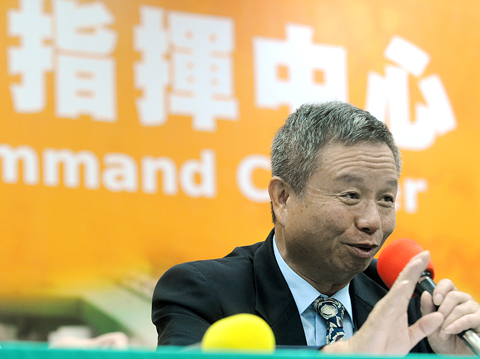Incoming Department of Health (DOH) Minister Yaung Chih-liang (楊志良) raised eyebrows on his first day in office earlier this month when he vowed to collect debt owed to the National Health Insurance (NHI) scheme from local governments.
He also promised to raise insurance premiums.
Yaung’s comments were regarded as a slap in the face for Taipei Mayor Hau Lung-bin (郝龍斌), as of a total of NT$60.3 billion (US$1.8 billion) in debts owed to NHI, Taipei City owes the most, at NT$34.7 billion.

PHOTO: WANG YI-SUNG, TAIPEI TIMES
Also, to help make the NHI a fairer system, Yaung said he favored raising insurance premiums, meaning that those with bigger salaries would pay more.
His vow to increase insurance premiums no doubt irritated many business owners and members of the public, with critics saying raising premiums was unwise given the sluggish economy.
Commenting on Yaung’s opening salvo, Asia University honorary professor Wu Kai-hsun (吳凱勳) said Yaung “has been too honest,” adding that this risked irritating people.
“While it is normal to adjust National Health Insurance premiums, to do so will require careful communication,” Wu said. “I’m afraid Yaung’s comments will scare people — especially employers, now that they will have to pay more.”
Prior to taking the job, Yaung was vice president of Asia University in Taichung. Yaung was also described as the “godfather” of Taiwan’s public health industry after devoting most of his career to teaching.
The vice superintendent of education at Chi Mei Hospital’s Liouying branch, Liu Shyun-yeu (劉巡宇), a close friend of Yaung’s, described him as a “friendly neighbor” who always keeps himself busy and is full of new ideas.
“He is a down-to-the-earth person who does not get angry easily,” Liu said.
Liu said that he and Yaung had known each other since 1998, when Yaung joined the DOH as a deputy minister and Liu was an executive officer and special aide to former minister Steve Chan (詹啟賢).
He said Yaung’s priorities did not surprise him at all.
“If he hadn’t said those things, he would not be the guy I have known for so many years,” Liu said.
Liu said Yaung had talked with him on whether he should accept the position as minister prior to making his decision.
“Yaung vowed to fix the problems at the National Health Insurance because he considers them to be his responsibility, since he was one of the architects of the National Health Insurance plan launched 15 years ago,” Liu said.
“Yaung really has guts to say what he said,” Liu said.
Liu, however, said that Yaung’s announcement on his first day in office was not exactly ministerial behavior and that he could end up making enemies who might threaten his career.
“However, he is doing the right thing,” Liu said.
As Yaung’s former superior officer, Chan said Yaung’s new appointment was “the right post for the right person.”
“He is an expert in public health. We need a guy like him in the fight against swine flu,” Chan said.
Many of Yaung’s friends and former coworkers said he was a “person with good communication abilities.”
DOH officials also felt his charm on his first day on the job.
“He is a nice guy,” a senior official at the DOH said on condition of anonymity. “I’ve never seen him angry — and I’ve known him since he was deputy minister several years ago. He was always patient when explaining things.”

Alain Robert, known as the "French Spider-Man," praised Alex Honnold as exceptionally well-prepared after the US climber completed a free solo ascent of Taipei 101 yesterday. Robert said Honnold's ascent of the 508m-tall skyscraper in just more than one-and-a-half hours without using safety ropes or equipment was a remarkable achievement. "This is my life," he said in an interview conducted in French, adding that he liked the feeling of being "on the edge of danger." The 63-year-old Frenchman climbed Taipei 101 using ropes in December 2004, taking about four hours to reach the top. On a one-to-10 scale of difficulty, Robert said Taipei 101

Nipah virus infection is to be officially listed as a category 5 notifiable infectious disease in Taiwan in March, while clinical treatment guidelines are being formulated, the Centers for Disease Control (CDC) said yesterday. With Nipah infections being reported in other countries and considering its relatively high fatality rate, the centers on Jan. 16 announced that it would be listed as a notifiable infectious disease to bolster the nation’s systematic early warning system and increase public awareness, the CDC said. Bangladesh reported four fatal cases last year in separate districts, with three linked to raw date palm sap consumption, CDC Epidemic Intelligence

Two Taiwanese prosecutors were questioned by Chinese security personnel at their hotel during a trip to China’s Henan Province this month, the Mainland Affairs Council (MAC) said yesterday. The officers had personal information on the prosecutors, including “when they were assigned to their posts, their work locations and job titles,” MAC Deputy Minister and spokesman Liang Wen-chieh (梁文傑) said. On top of asking about their agencies and positions, the officers also questioned the prosecutors about the Cross-Strait Joint Crime-Fighting and Judicial Mutual Assistance Agreement, a pact that serves as the framework for Taiwan-China cooperation on combating crime and providing judicial assistance, Liang

US climber Alex Honnold left Taiwan this morning a day after completing a free-solo ascent of Taipei 101, a feat that drew cheers from onlookers and gained widespread international attention. Honnold yesterday scaled the 101-story skyscraper without a rope or safety harness. The climb — the highest urban free-solo ascent ever attempted — took just more than 90 minutes and was streamed live on Netflix. It was covered by major international news outlets including CNN, the New York Times, the Guardian and the Wall Street Journal. As Honnold prepared to leave Taiwan today, he attracted a crowd when he and his wife, Sanni,